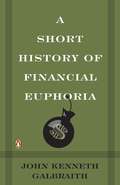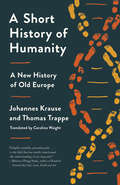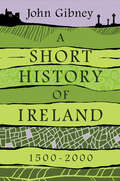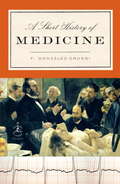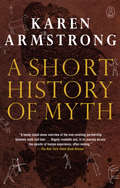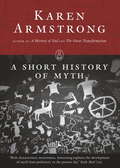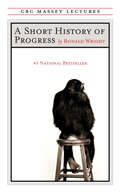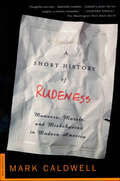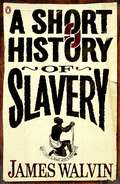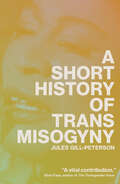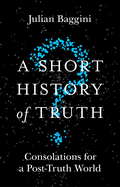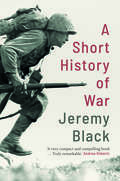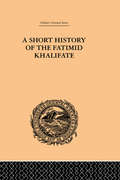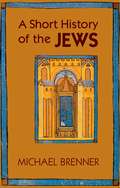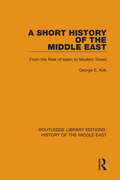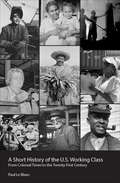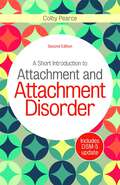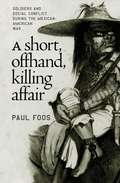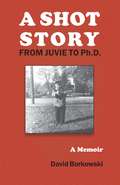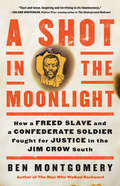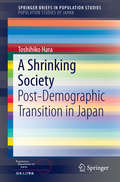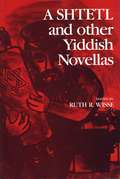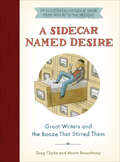- Table View
- List View
A Short History of Financial Euphoria
by John Kenneth GalbraithThe world-renowned economist offers "dourly irreverent analyses of financial debacle from the tulip craze of the seventeenth century to the recent plague of junk bonds. "-The Atlantic. .
A Short History of Financial Euphoria
by John Kenneth GalbraithThe world-renowned economist offers "dourly irreverent analyses of financial debacle from the tulip craze of the seventeenth century to the recent plague of junk bonds."-The Atlantic.
A Short History of Humanity: A New History of Old Europe
by Johannes Krause Thomas Trappe&“A highly readable, personal guide to the twists and turns in unravelling ancient DNA: Krause and Trappe expertly recount the story of archaeogenetics to reveal how this new field has utterly transformed understanding of our deep past.&”—Rebecca Wragg Sykes, author of Kindred: Neanderthal Life, Love, Death and ArtJohannes Krause is the director of the Max Planck Institute for Evolutionary Anthropology and a brilliant pioneer in the field of archaeogenetics—archaeology augmented by DNA sequencing technology—which has allowed scientists to reconstruct human history reaching back hundreds of thousands of years before recorded time. In this surprising account, Krause and journalist Thomas Trappe rewrite a fascinating chapter of this history, the peopling of Europe, that takes us from the Neanderthals and Denisovans to the present. We know now that a wave of farmers from Anatolia migrated into Europe 8,000 years ago, essentially displacing the dark-skinned, blue-eyed hunter-gatherers who preceded them. This Anatolian farmer DNA is one of the core genetic components of people with contemporary European ancestry. Archaeogenetics has also revealed that indigenous North and South Americans, though long thought to have been East Asian, also share DNA with contemporary Europeans. Krause and Trappe vividly introduce us to the prehistoric cultures of the ancient Europeans: the Aurignacians, innovative artisans who carved flutes and animal and human forms from bird bones more than 40,000 years ago; the Varna, who buried their loved ones with gold long before the Pharaohs of Egypt; and the Gravettians, big-game hunters who were Europe&’s most successful early settlers until they perished in the ice age. Genetics has earned a reputation for smuggling racist ideologies into science, but cutting-edge science makes nonsense of eugenics and &“pure&” bloodlines. Immigration and genetic exchanges have always defined our species; who we are is a question of culture, not biological inheritance. This revelatory book offers us an entirely new way to understand ourselves, both past and present.
A Short History of Indians in Canada: Stories
by Thomas KingWinner of the McNally Robinson Aboriginal Book of the Year and the Aboriginal Fiction Book of the Year—a collection of twenty short stories told in Thomas King's classic, wry, irreverent, and allegorical voice.
A Short History of Ireland, 1500–2000
by John GibneyA brisk, concise, and readable overview of Irish history from the Protestant Reformation to the dawn of the twenty-first century. Five centuries of Irish history are explored in this informative and accessible volume. Beginning with Ireland&’s modern period at the dawn of the sixteenth century, John Gibney continues through to virtually the present day, offering an integrated overview of the island nation&’s cultural, political, and socioeconomic evolution. This succinct, scholarly study covers important historical events, including the Cromwellian conquest and settlement, the Great Famine, and the struggle for Irish independence. Along the way, it explores major themes such as Ireland&’s often contentious relationship with Britain, the impact of the Protestant Reformation, the ongoing religious tensions it inspired, and the global reach of the Irish diaspora. This unique, wide-ranging work assimilates the most recent scholarship on a wide range of historical controversies, making it an essential addition to the library of any student of Irish studies.
A Short History of Medicine
by Frank Gonzalez-CrussiIn this lively, learned, and wholly engrossing volume, F. González-Crussi presents a brief yet authoritative five-hundred-year history of the science, the philosophy, and the controversies of modern medicine. While this illuminating work mainly explores Western medicine over the past five centuries, González-Crussi also describes how modern medicine's roots extend to both Greco-Roman antiquity and Eastern medical traditions. Covered here in engaging detail are the birth of anatomy and the practice of dissections; the transformation of surgery from a gruesome art to a sophisticated medical specialty; a short history of infectious diseases; the evolution of the diagnostic process; advances in obstetrics and anesthesia; and modern psychiatric therapies and the challenges facing organized medicine today. González-Crussi's approach to these and other topics stems from his professed belief that the history of medicine isn't just a continuum of scientific achievement but is deeply influenced by the personalities of the men and women who made or implemented these breakthroughs. And, as we learn, this field's greatest practitioners were, like the rest of us, human beings with flaws, weaknesses, and limitations-including some who were scoundrels.Insightful, informed, and at times controversial in its conclusions, A Short History of Medicine offers an exceptional introduction to the major and many minor facets of its subject. Written by a renowned author and educator, this book gives us the very essence of humankind's search to mitigate suffering, save lives, and unearth the mysteries of the human animal. Praise for F. González-Crussi"What Oliver Sacks does for the mind, González-Crussi [does] for the eye in this captivating set of philosophical meditations on the relationship between the viewer and the viewed."-Publishers Weekly, on On Seeing"[González-Crussi fuses] science, literature, and personal history into highly civilized artifacts."-The Washington Post, on There Is a World ElsewhereFrom the Hardcover edition.
A Short History of Myth
by Karen Armstrong"Human beings have always been mythmakers." So begins best-selling writer Karen Armstrong's concise yet compelling investigation into myth: what it is, how it has evolved, and why we still so desperately need it. She takes us from the Paleolithic period and the myths of the hunters right up to the "Great Western Transformation" of the last five hundred years and the discrediting of myth by science. The history of myth is the history of humanity, our stories and beliefs, our curiosity and attempts to understand the world, which link us to our ancestors and each other. Heralding a major series of retellings of international myths by authors from around the world, Armstrong's characteristically insightful and eloquent book serves as a brilliant and thought-provoking introduction to myth in the broadest sense-and explains why if we dismiss it, we do so at our peril.
A Short History of Myth (Myths series)
by Karen ArmstrongWhat are myths? How have they evolved? And why do we still so desperately need them? A history of myth is a history of humanity, Karen Armstrong argues in this insightful and eloquent book: our stories and beliefs, our attempts to understand the world, link us to our ancestors and each other. This is a brilliant and thought-provoking introduction to myth in the broadest sense - from Palaeolithic times to the "Great Western Transformation" of the last 500 years - and why we dismiss it only at our peril.From the Trade Paperback edition.
A Short History of Progress: Fifteenth Anniversary Edition (The CBC Massey Lectures)
by Ronald WrightNow more relevant than ever, Ronald Wright’s #1 national bestseller, A Short History of Progress. The fifteenth anniversary edition includes a new introduction warning of the accelerating patterns of progress and disaster.Each time history repeats itself, so it’s said, the price goes up. The twentieth century was a time of runaway growth in human population, consumption, and technology, placing a colossal load on all natural systems, especially earth, air, and water — the very elements of life. The most urgent questions of the twenty-first century are: Where will this growth lead? Can it be consolidated or sustained? And what kind of world is our present bequeathing to our future?In his #1 national bestseller A Short History of Progress Ronald Wright argues that our modern predicament is as old as civilization, a 10,000-year experiment we have participated in but seldom controlled. Only by understanding the patterns of triumph and disaster that humanity has repeated around the world since the Stone Age can we recognize the experiment’s inherent dangers, and, with luck and wisdom, shape its outcome. In his new introduction to the fifteenth anniversary edition, Wright looks at the past fifteen years of human innovation — and asks whether we can still get the future right.
A Short History of Rudeness: Manners, Morals, and Misbehavior in Modern America
by Mark CaldwellA funny and provocative cultural history of class, manners, and the decline of civilityIn his smart and thought provoking new book, literary/social critic Mark Caldwell gives us a history of the demise of manners and charts the progress of an epidemic of rudeness in America. The breakdown of civility has in recent years become a national obsession, and our modern climate of boorishness has cultivated a host of etiquette watchdogs, like Miss Manners and Martha Stewart, with which we defend ourselves against an onslaught of nastiness. But Caldwell demonstrates that the foundations of etiquette actually began to corrode several centuries ago with the blurring of class lines. Touching on aspects of both our public and private lives, including work, family, and sex, A Short History of Rudeness examines how the rules of our behaviour have changed and explains why, no matter how hard we try, we can never return to a golden era of manners and mores.
A Short History of Slavery
by James WalvinAs we approach the bicentenary of the abolition of the Atlantic trade, Walvin has selected the historical texts that recreate the mindset that made such a savage institution possible - morally acceptable even. Setting these historical documents against Walvin's own incisive historical narrative, the two layers of this extraordinary, definitive account of the Atlantic slave trade enable us to understand the rise and fall of one of the most shameful chapters in British history, the repercussions of which the modern world is still living with.
A Short History of Trans Misogyny
by Jules Gill-PetersonAn accessible, bold new vision for the future of intersectional trans feminism, called "one of the best books in trans studies in recent years" by Susan Stryker&“A beautifully written and argued book.&” - Torrey Peters, author of Detransition, BabyThere is no shortage of voices demanding everyone pay attention to the violence trans women suffer. But one frighteningly basic question seems never to be answered: why does it happen? If men are not inherently evil and trans women do not intrinsically invite reprisal—which would make violence unstoppable—then the psychology of that violence had to arise at a certain place and time. The trans panic had to be invented.Award-winning historian Jules Gill-Peterson takes us from the bustling port cities of New York and New Orleans to the streets of London and Paris in search of the emergence of modern trans misogyny. She connects the colonial and military districts of the British Raj, the Philippines, and Hawai&’i to the lively travesti communities of Latin America, where state violence has stamped a trans label on vastly different ways of life. Weaving together the stories of historical figures in a richly detailed narrative, the book shows how trans femininity emerged under colonial governments, the sex work industry, the policing of urban public spaces, and the area between the formal and informal economy.A Short History of Trans Misogyny is the first book to explain why trans women are burdened by such a weight of injustice and hatred.
A Short History of Truth: Consolations for a Post-Truth World
by Julian BagginiHow did we find ourselves in a "post-truth" world of "alternative facts"? And can we get out of it? A Short History of Truth sets out to answer these questions by looking at the complex history of truth and falsehood. It identifies ten types of supposed truth and explains how easily each can become the midwife of falsehood. There is no species of truth that we can rely on unquestioningly, but that does not mean the truth can never be established. Attaining truth is an achievement we need to work for, and each chapter will end up with a truth we can have some confidence in.This history builds into a comprehensive and clear explanation of why truth is now so disputed by exploring 10 kinds of truth:1. Eternal truths.2. Authoritative truths.3. Esoteric truths.4. Reasoned truths.5. Evidence-based truths.6. Creative truths.7. Relative truths. 8. Powerful truths9. Moral truths.10. Holistic truths. Baggini provides us with all we need to restore faith in the value and possibility of truth as a social enterprise. Truth-seekers need to be sceptical not cynical, autonomous not atomistic, provisional not dogmatic, open not empty, demanding not unreasonable.
A Short History of War
by Jeremy BlackA wonderfully engaging, accessible introduction to war, from ancient times to the present and into the future Throughout history, warfare has transformed social, political, cultural, and religious aspects of our lives. We tell tales of wars—past, present, and future—to create and reinforce a common purpose. In this engaging overview, Jeremy Black examines war as a global phenomenon, looking at the First and Second World Wars as well as those ranging from Han China and Assyria, Imperial Rome, and Napoleonic France to Vietnam and Afghanistan. Black explores too the significance of warfare more broadly and the ways in which cultural understandings of conflict have lasting consequences in societies across the world. Weaponry, Black argues, has had a fundamental impact on modes of war: it created war in the air and transformed it at sea. Today, as twentieth-century weapons are challenged by drones and robotics, Black examines what the future of warfare looks like.
A Short History of the Fatimid Khalifate
by De Lacy O'LearyFirst published in 2000. Routledge is an imprint of Taylor & Francis, an informa company.
A Short History of the Jews
by Michael BrennerA concise narrative history that brings the story of the Jewish people marvelously to lifeThis is a sweeping and powerful narrative history of the Jewish people from biblical times to today. Based on the latest scholarship and richly illustrated, it is the most authoritative and accessible chronicle of the Jewish experience available. Michael Brenner tells a dramatic story of change and migration deeply rooted in tradition, taking readers from the mythic wanderings of Moses to the unspeakable atrocities of the Holocaust; from the Babylonian exile to the founding of the modern state of Israel; and from the Sephardic communities under medieval Islam to the shtetls of eastern Europe and the Hasidic enclaves of modern-day Brooklyn. The book is full of fascinating personal stories of exodus and return, from that told about Abraham, who brought his newfound faith into Canaan, to that of Holocaust survivor Esther Barkai, who lived on a kibbutz established on a German estate seized from the Nazi Julius Streicher as she awaited resettlement in Israel. Describing the events and people that have shaped Jewish history, and highlighting the important contributions Jews have made to the arts, politics, religion, and science, A Short History of the Jews is a compelling blend of storytelling and scholarship that brings the Jewish past marvelously to life.
A Short History of the Middle East: From the Rise of Islam to Modern Times (Routledge Library Editions: History of the Middle East #11)
by George E. KirkThis book, first published in 1948, grew out of a series of lectures delivered since the War at the Middle East Centre for Arab Studies to British students who required a solid grounding in Middle East history and politics to assist in fitting them for active careers in the region. These lectures, by a leading specialist on Middle Eastern history, generated such interest that they were adapted and published in book form for a wider reading public. The book forms a comprehensive introduction to the history of the Middle East.
A Short History of the U.S. Working Class: From Colonial Times to the Twenty-First Century (Revolutionary Studies)
by Paul Le Blanc&“His aim is to make the history of labor in the U.S. more accessible to students and the general reader. He succeeds&” (Booklist). In a blend of economic, social, and political history, Paul Le Blanc shows how important labor issues have been, and continue to be, in the forging of our nation. Within a broad analytical framework, he highlights issues of class, gender, race, and ethnicity, and includes the views of key figures of United States labor. The result is a thought-provoking look at centuries of American history from a perspective that is too often ignored or forgotten. &“An excellent overview, enhanced by a valuable glossary.&” —Elaine Bernard, director of the Harvard Trade Union Program
A Short Introduction to Attachment and Attachment Disorder, Second Edition
by Colby PearceConcise and easy-to-understand, this book provides an introduction to what attachment means and how to recognise attachment disorder in children. Colby Pearce explains how complex problems in childhood may stem from the parent-child relationship during a child's early formative years, and later from the child's engagement with the broader social world. The book explores the mind-set of difficult and traumatised children and the motivations behind their complex tendencies and behaviours. It goes on to offer a comprehensive set of tried-and-tested practical strategies that can be used with children affected by an attachment disorder. This second edition has been updated to include the new DSM-5 diagnostic criteria for Reactive Attachment Disorder and an increased number of illustrative case vignettes. This is a perfect introduction to the subject for parents, carers and practitioners in supportive roles caring for children.
A Short, Offhand, Killing Affair
by Paul FoosThe Mexican-American War (1846-48) found Americans on new terrain. A republic founded on the principle of armed defense of freedom was now going to war on behalf of Manifest Destiny, seeking to conquer an unfamiliar nation and people. Through an examination of rank-and-file soldiers, Paul Foos sheds new light on the war and its effect on attitudes toward other races and nationalities that stood in the way of American expansionism.Drawing on wartime diaries and letters not previously examined by scholars, Foos shows that the experience of soldiers in the war differed radically from the positive, patriotic image trumpeted by political and military leaders seeking recruits for a volunteer army. Promised access to land, economic opportunity, and political equality, the enlistees instead found themselves subjected to unusually harsh discipline and harrowing battle conditions. As a result, some soldiers adapted the rhetoric of Manifest Destiny to their own purposes, taking for themselves what had been promised, often by looting the Mexican countryside or committing racial and sexual atrocities. Others deserted the army to fight for the enemy or seek employment in the West. These acts, Foos argues, along with the government's tacit acceptance of them, translated into a more violent, damaging variety of Manifest Destiny.
A Shot Story: From Juvie to Ph.D.
by David BorkowskiThe botched robbery didn’t do it. Neither did the three gunshots. It wasn’t until he was administered last rites that David Borkowski realized he was about to die, at age fifteen. A Shot Story: From Juvie to Ph.D. is a riveting account of how being shot saved his life and helped a juvenile delinquent become an esteemed English professor.Growing up in a working-class section of Staten Island, David and his friends thought they had all the answers: They knew where to hang out without being hassled, where to get high, and what to do if the cops showed up. But when David and his friend called in a pizza order so they could rob the delivery man, things didn’t turn out as they’d planned. Staring down the barrel of a gun, David and his friend panicked and took off as the cop fired. Convinced the cop was shooting harmless “salt” bullets, David darted through lawns as the cop gave chase. Much later, when David was bleeding to death, did the cops realize they had hit one of their own—the son of a fellow cop.Borderline illiterate at the time of the shooting, David took his future into his own hands and found salvation in books. But his attempts to improve his life were stymied by lack of familial support. Bound on all sides by adults who had no faith in his ability to learn or to succeed, David persevered and earned his Ph.D..Funny and poignant, but always honest and reflective, A Shot Story tracks David Borkowski’s life before and after the “accident” and tells how his having been a rather unremarkable student may have been a blessing in disguise. A wonderful addition to the working-class narrative genre, A Shot Story presents a gripping account of the silences of working-class culture as well as the male subculture of Staten Island. Through his heartfelt memoir, Borkowski explores the universal lesson of turning a wrong into a rite of passage.
A Shot in the Moonlight: How a Freed Slave and a Confederate Soldier Fought for Justice in the Jim Crow South
by Ben MontgomeryThe sensational true story of George Dinning, a freed slave, who in 1899 joined forces with a Confederate war hero in search of justice in the Jim Crow south. &“Taut and tense. Inspiring and terrifying in its timelessness.&”(Colson Whitehead, Pulitzer Prize-winning author of The Underground Railroad )Named a most anticipated book of 2021 by O, The Oprah MagazineNamed a "must-read" by the Chicago Review of BooksOne of CNN's most anticipated books of 2021 After moonrise on the cold night of January 21, 1897, a mob of twenty-five white men gathered in a patch of woods near Big Road in southwestern Simpson County, Kentucky. Half carried rifles and shotguns, and a few tucked pistols in their pants. Their target was George Dinning, a freed slave who'd farmed peacefully in the area for 14 years, and who had been wrongfully accused of stealing livestock from a neighboring farm. When the mob began firing through the doors and windows of Dinning's home, he fired back in self-defense, shooting and killing the son of a wealthy Kentucky family.So began one of the strangest legal episodes in American history — one that ended with Dinning becoming the first Black man in America to win damages after a wrongful murder conviction.Drawing on a wealth of never-before-published material, bestselling author and Pulitzer Prize finalist Ben Montgomery resurrects this dramatic but largely forgotten story, and the unusual convergence of characters — among them a Confederate war hero-turned-lawyer named Bennett H. Young, Kentucky governor William O'Connell Bradley, and George Dinning himself — that allowed this unlikely story of justice to unfold in a time and place where justice was all too rare.
A Shrinking Society: Post-Demographic Transition in Japan (SpringerBriefs in Population Studies)
by Toshihiko HaraThis is the book to focus on a new phenomenon emerging in the twenty-first century: the rapidly aging and decreasing population of a well-developed country, namely, Japan. The meaning of this phenomenon has been successfully clarified as the possible historical consequence of the demographic transition from high birth and death rates to low ones. Japan has entered the post-demographic transitional phase and will be the fastest-shrinking society in the world, leading other Asian countries that are experiencing the same drastic changes. The author used the historical statistics, compiled by the Statistic Bureau, Ministry of Internal Affairs and Communications in 2006 and population projections for released in 2012 by the National Institute of Population and Social Security Research, to show the past and future development of the dependency ratio from 1891 to 2060. Then, utilizing the population life table and net reproduction rate, the effects of increasing life expectancy and declining fertility on the dependency ratio were observed separately. Finally, the historical relationships among women's survival rates at reproductive age, the theoretical fertility rate to maintain the replacement level and the recorded total fertility rate (TFR) were analyzed. Historical observation showed TFR adapting to the theoretical level of fertility with a certain time lag and corresponding to women's survival rates at reproductive age. Women's increasing lifespan and survival rates could have influenced decision making to minimize the risk of childbearing. Even if the theoretical fertility rate meets the replacement level, women's views of minimizing the risk may remain unchanged because for women the cost-benefit imbalance in childbearing is still too high in Japan. Based on the findings, the author discusses the sustainability of Japanese society in relation to national finances, social security reform, family policies, immigration policies and community polices.
A Shtetl and Other Yiddish Novellas
by Ruth WisseThe five short novellas which comprise this anthology were written between 1890 and World War I. All share a common setting--the Eastern European Jewish town or shtetl, and all deal in different ways with a single topic--the Jewish confrontation with modernity. The authors of these novellas are among the greatest masters of Yiddish prose. In their work, today's reader will discover a literary tradition of considerable scope, energy, and variety and will come face to face with an exceptionally memorable cast of characters and with a human community now irrevocably lost. In her general introduction, Professor Wisse traces the development of modern Yiddish literature in the late 19th and early 20th centuries and describes the many shifts that took place between the Yiddish writers and the world about which they wrote. She also furnishes a brief introduction for each novella, giving the historical and biographical background and offering a critical interpretation of the work.
A Sidecar Named Desire: Great Writers and the Booze That Stirred Them
by Greg Clarke Monte BeauchampA rollicking illustrated history of alcohol and its literary imbibers, from Jane Austen’s beer brewing to James Joyce’s passion for Guinness to E.B. White’s cure for writers’ block—a dry martini—by celebrated illustrator Greg Clarke and award-winning editor/art director Monte Beauchamp.“The tools that I need for my trade are simply pen, paper, food, tobacco, and a little whiskey.” —William Faulkner “I keep a dictionary, a Bible, a deck of cards and a bottle of sherry in the room.” —Maya Angelou “A writer who drinks carefully is probably a better writer.” —Stephen KingThroughout history, there has been no greater catalyst for creativity among writers, so they claim, than a good, stiff drink. In this graphic volume, the authors take us on an unforgettable literary bar crawl, packed with historical factoids, anecdotes, booze trivia, and fascinating detours into the lives of our favorite writers, along with literary-themed cocktail recipes such as Ernest Hemingway’s Death in the Afternoon and Philip Larkin’s Gin and Tonic set to verse. For the literary-minded drinker, whether wine, gin, vodka, beer, whiskey, or tequila is your elixir of choice, A Sidecar Named Desire will whet your appetite. Bottoms up!
